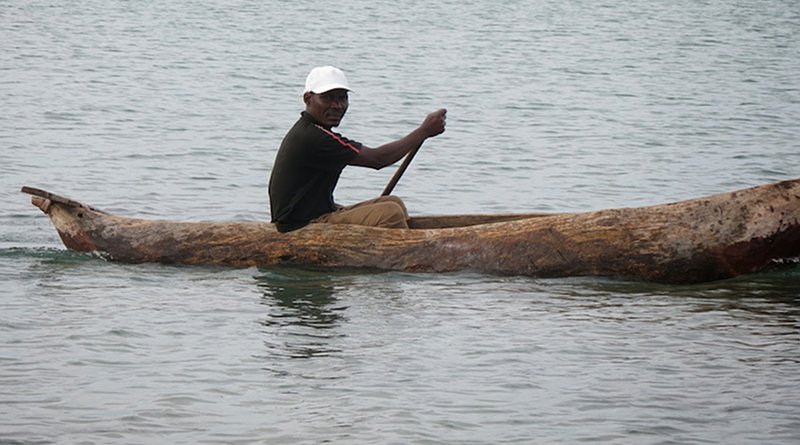Sex Bait Threatens Women’s Lives In Much Of Africa – Analysis
By IDN
By Kizito Makoye
It’s almost midday in Nsisi – a fishing village nestled on the shore of Lake Nyasa – and Lucy Gwamaka is busy unfurling a canvas to dry her sardines in the sun.
For the 33-year-old mother of three, life is a daily struggle. Her wrinkled face and sun-parched skin makes her look older than her age.
Distraught and cash-strapped, Gwamaka has been grappling to make ends meet ever since her husband died four years ago after a short battle with malaria.
Caught up in financial doldrums, Gwamaka switched to the fish business two years ago, but not having sufficient capital, she ended up trading sex in exchange for fish catches.
Extreme poverty currently affecting communities across Eastern Africa is driving women to resort to desperate activities, including sex, opening them up to the risk of contracting sexually-transmitted diseases, notably HIV/AIDS.
While the number of people trapped in extreme poverty dropped significantly at global level from 1990 to 2015, efforts to eradicate poverty are still an uphill struggle for many women.
While the Sustainable Development Goals (SDGs) call for end of discrimination against women in the labour market, many of them are still systematically harassed and denied the same work rights as men.
Globally, women earn only 77 cents for every dollar that men receive for the same work. Thirty-five percent of them have reportedly experienced physical or sexual abuse, according to the United Nations.
“I don’t like to trade sex for fish, but I’m sometimes forced to do so when I don’t get the money to pay for the fish,” said Gwamaka.
Sex-for-fish is not a new phenomenon in sub-Saharan Africa. Most women in communities surrounding lakes are often tempted to engage in sex due to poverty and lack of opportunities.
While many people in communities around Lake Nyasa largely depend on farming and fishing for a livelihood, recurring drought triggered by the worsening impacts of climate change has badly affected crop yields.
As East Africa continues to experience changing weather patterns, experts warn that south-western Tanzania is likely to suffer more extreme weather and drought spells, which would likely affect livelihoods.
“I used to work in the fields and reap enough food to suffice my family, but drought has made it impossible to rely on farming any longer,” Gwamaka told IDN.
Fishing is an important activity in Nsisi village, with women traders often verbally agreeing with fishermen to take some fish and pay back once they have sold them.
However, because of economic hardship, female traders sometimes fail to pay for the fish and local residents say they often end up offering sex as compensation.
Sex as a medium of exchange may be tacitly or explicitly agreed to by individuals, and spot checks by this reporter showed that women rarely use money to pay for the fish when the fishermen come ashore with their night-time catch.
While most such agreements are secretly made between women traders and fishermen, the transactional sex phenomenon is deeply rooted and widely embraced by the fishing communities.
However, Issa Mtulya, a 51-year-old fisherman in Nsisi, dismissed claims that fishermen use fish as bait to seduce women. “Why should we do so,” he asked. “We have our families. If someone has done so, it may be a single case, but you cannot accuse everyone.”
In a community where HIV/AIDS is still a menace, poverty and lack of awareness on how to protect themselves is making women highly vulnerable to the disease.
Ludewa district, in Tanzania’s southern highlands, is among the areas with a high prevalence of HIV/AIDS and large numbers of the adult population are believed to be infected with the deadly virus, according to recent government statistics.
“Most men here prefer unprotected sex, and women who sleep with them hardly ever refuse,” said Gwamaka.
Exchanging fish for sex in Nsisi, is a humiliating business that women engage in, as such it undermines efforts to fight the HIV/AIDS pandemic, local village leaders say.
“Poverty is the main reason that force women to trade sex,” said Emmanuel Mlimbo, a local village leader. “If they had other income-generating opportunities, they wouldn’t fall into that trap.”
According to Mlimbo, the government is working with local village leaders to identify families deemed extremely poor and food insecure so that they can qualify to receive cash handouts through the government-run Social Action Fund (TASAF) for implementing Tanzania’s Productive Social Safety Nets (PSSN) project.
Evidence from Africa and elsewhere shows that cash transfer programmes are effective instruments for improving the living conditions of poor and vulnerable households, improve their education, health and help them link with income-generating opportunities.
Asha Kwemba, a former fish vendor and beneficiary of TASAF’s cash handouts, has acquired new skills and she now spends most of her time making colourful batik fabrics and soap bars.
“I’m better off financially than I was three years ago. I encourage fellow women who are trapped in poverty to keep fighting and never to lose hope,” she said with a broad smile.
Although crossing such a milestone seems like a distant dream for Gwamaka, she is looking to her future, saying “I am tired of being a sex slave. I want to do a genuine business which generates legitimate income.”
As part of her plans, Gwamaka is thinking of securing a loan from a local Savings and Credit Cooperative Society (SACCOS) in the village known as Tushirikishane, to set up a small shop selling some consumer goods including cooking oil, soaps and sugar.
“I will promise to work so hard to realise my dream and succeed in life,” she says optimistically.

